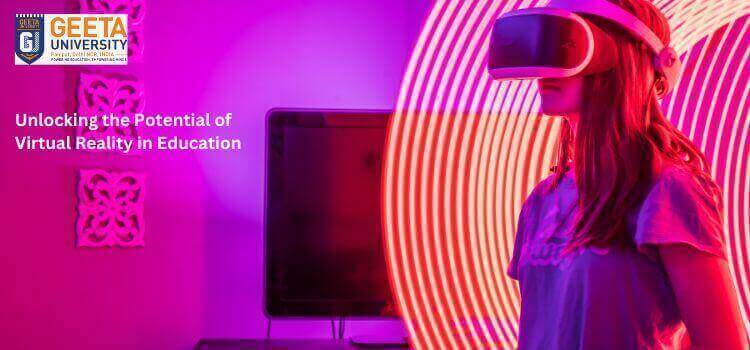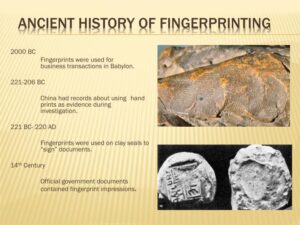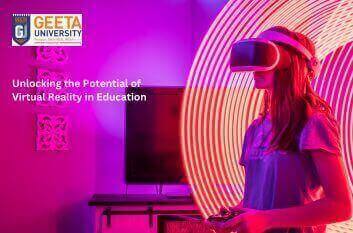Unlocking the Potential of Virtual Reality in Education – Geeta University
Uncategorized Best Career Options in geeta university, best college, best diploma university in haryana, Best engineering College in Haryana, best Law college in Haryana, best mba college in haryana, best MCA college in haryana, Best University for BCA in Haryana, Best University in Haryana, Geeta University, Uncategorized
Unlocking the Potential of Virtual Reality in Education – Geeta University
Virtual Reality (VR) is a rapidly evolving technology that has the potential to revolutionize the field of education. By immersing students in virtual environments, VR offers unique learning experiences that go beyond traditional classroom methods. In this blog, we will explore the vast potential of virtual reality in education and how it can enhance engagement, knowledge retention, and critical thinking skills.
Immersive Learning Experiences :
Virtual reality provides immersive learning experiences by transporting students to virtual environments that replicate real-world scenarios or historical events. Whether it’s exploring ancient civilizations, conducting virtual science experiments, or practicing complex skills in a safe virtual setting, VR allows students to engage with subject matter in a hands-on and experiential manner. This immersive approach enhances understanding, sparks curiosity, and makes learning more memorable and impactful.
Enhancing Engagement and Motivation :
Virtual reality captivates students’ attention and enhances engagement by creating an interactive and interactive learning environment. The immersive nature of VR stimulates multiple senses, providing a more engaging and stimulating learning experience compared to traditional textbooks or lectures. This heightened engagement fosters motivation, curiosity, and a desire to explore and learn. Students become active participants in their own learning journey, leading to increased knowledge retention and a deeper understanding of the subject matter.
Personalized and Adaptive Learning :
Virtual reality can be customized to meet the individual needs and learning styles of students. Through adaptive VR programs, students can receive personalized instruction, tailored feedback, and targeted interventions based on their performance and progress. This personalized approach to learning helps address the diverse learning needs of students and promotes mastery of the subject matter at their own pace. Virtual reality can also simulate real-world scenarios that challenge students at different levels, fostering critical thinking, problem-solving, and decision-making skills.
Collaboration and Global Connectivity :
Virtual reality offers opportunities for collaboration and global connectivity in education. Students can collaborate with peers from different locations, cultures, and backgrounds within a shared virtual environment. This promotes cross-cultural understanding, teamwork, and the development of global competencies. VR also enables students to interact with experts, guest speakers, and educators from around the world, expanding their knowledge and perspectives. By breaking down geographical barriers, virtual reality fosters a sense of global citizenship and prepares students for the interconnected world they will navigate in their future careers.
Real-World Application and Career Readiness :
Virtual reality provides a platform for students to apply their knowledge in real-world contexts, preparing them for future careers. Through virtual simulations, students can practice and refine skills required in various professions, such as medical procedures, engineering design, or architectural planning. VR enables students to gain practical experience, make informed decisions, and learn from mistakes in a risk-free environment. This hands-on application of knowledge enhances career readiness and equips students with the skills and confidence to enter the workforce with a solid foundation of practical experience.
Conclusion :
Virtual reality has the potential to transform education by offering immersive learning experiences, enhancing engagement and motivation, personalizing instruction, fostering collaboration, and preparing students for real-world challenges. As the technology continues to advance, incorporating virtual reality into educational settings opens up new dimensions of learning and expands the possibilities for knowledge acquisition and skill development. By unlocking the potential of virtual reality in education, we can create transformative learning experiences that empower students to thrive in the digital age and beyond.
If you like it, then keep reading the top university in Delhi, NCR viz. Geeta University’s blogs!!!
- By Garvita Aggarwal
Related Posts

The Crucial Role of Soft Skills in Career Advancement
Introduction In the dynamic landscape of today’s job market, possessing technical expertise alone is no longer sufficient for achieving career success. While hard skills and academic qualifications are undoubtedly essential, it’s the often-overlooked soft skills that truly set individuals apart

Unraveling Mysteries: The Evolution and Impact of Fingerprint Science Worldwide
Introduction Fingerprint science stands as a cornerstone in forensic investigation, weaving intricate tales of identity, criminality, and justice. This age-old practice has evolved from a rudimentary form of identification to a sophisticated forensic tool embraced globally. In this comprehensive exploration,
3D Integrated Circuits for AI Hardware Scaling
Introduction As artificial intelligence (AI) models continue to scale in complexity—driven by advancements in deep learning, natural language processing, and generative AI—the underlying hardware must evolve to meet ever-growing demands for computational power, memory access, and energy efficiency. Traditional 2D



